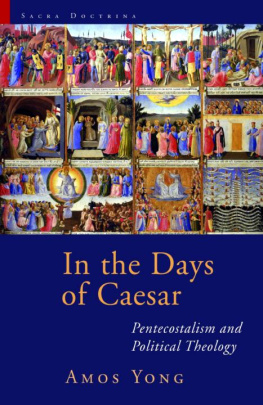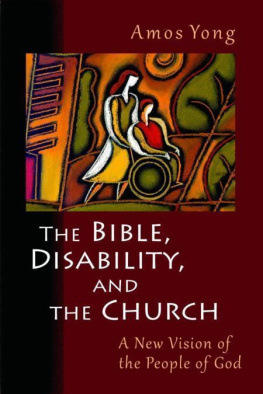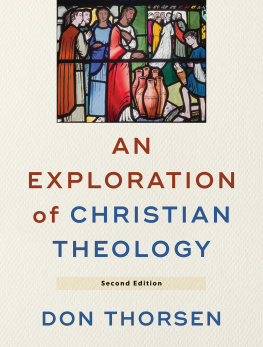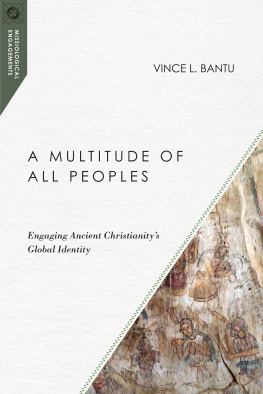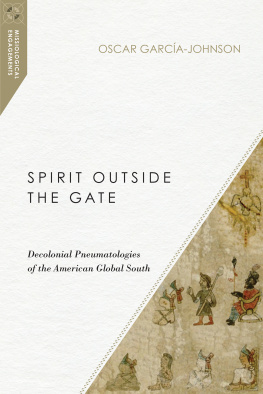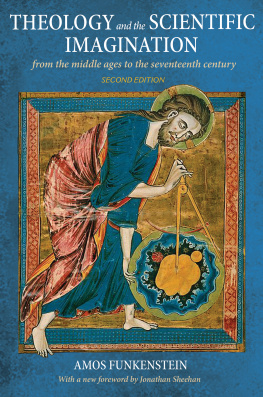Amos Yong - The Missiological Spirit: Christian Mission Theology in the Third Millennium Global Context
Here you can read online Amos Yong - The Missiological Spirit: Christian Mission Theology in the Third Millennium Global Context full text of the book (entire story) in english for free. Download pdf and epub, get meaning, cover and reviews about this ebook. year: 2014, publisher: Cascade Books, an Imprint of Wipf and Stock Publishers, genre: Religion. Description of the work, (preface) as well as reviews are available. Best literature library LitArk.com created for fans of good reading and offers a wide selection of genres:
Romance novel
Science fiction
Adventure
Detective
Science
History
Home and family
Prose
Art
Politics
Computer
Non-fiction
Religion
Business
Children
Humor
Choose a favorite category and find really read worthwhile books. Enjoy immersion in the world of imagination, feel the emotions of the characters or learn something new for yourself, make an fascinating discovery.

The Missiological Spirit: Christian Mission Theology in the Third Millennium Global Context: summary, description and annotation
We offer to read an annotation, description, summary or preface (depends on what the author of the book "The Missiological Spirit: Christian Mission Theology in the Third Millennium Global Context" wrote himself). If you haven't found the necessary information about the book — write in the comments, we will try to find it.
Amos Yong: author's other books
Who wrote The Missiological Spirit: Christian Mission Theology in the Third Millennium Global Context? Find out the surname, the name of the author of the book and a list of all author's works by series.
The Missiological Spirit: Christian Mission Theology in the Third Millennium Global Context — read online for free the complete book (whole text) full work
Below is the text of the book, divided by pages. System saving the place of the last page read, allows you to conveniently read the book "The Missiological Spirit: Christian Mission Theology in the Third Millennium Global Context" online for free, without having to search again every time where you left off. Put a bookmark, and you can go to the page where you finished reading at any time.
Font size:
Interval:
Bookmark:

Christian Mission Theology in the Third Millennium Global Context
Amos Yong

The Missiological Spirit
Christian Mission Theology in the Third Millennium Global Context
Copyright 2014 Amos Yong. All rights reserved. Except for brief quotations in critical publications or reviews, no part of this book may be reproduced in any manner without prior written permission from the publisher. Write: Permissions. Wipf and Stock Publishers, W. th Ave., Suite , Eugene, OR 97401 .
Cascade Book
An Imprint of Wipf and Stock Publishers
W. th Ave., Suite
Eugene, OR 97401
www.wipfandstock.com
ISBN : 978-1-62564-670-5
EISBN 13: 978-1-63087-600-5
Cataloguing-in-Publication Data
Yong, Amos.
The missiological spirit : Christian mission theology for the third millennium global context / Amos Yong.
xvi + p. ; cm. Includes bibliographical references and indexes.
ISBN 13: 978-1-62564-670-5
MissionsTheory. Pentecostalism. Christianity and other religions. Holy Spirit. I. Title.
BV2063 .Y65 2014
Manufactured in the U.S.A.09/14/2014
To
Julie and Wonsuk Ma,
and to Scott Sunquist,
exemplary models of the missiological spirit
T his book is close on the heels of and intended to be a companion to my The Dialogical Spirit: Christian Reason and Theological Method for the Third Millennium (Cascade Books, 2014 ). I am grateful to Robin Parry, Rodney Clapp, and the editorial team at Cascade Books for seeing their value, especially since these two volumes consist, by and large, of essays and articles written for and published separately in other venues. Christian Amondson, Matthew Wimer, and Laura Poncy, among others at Wipf and Stock, have also been helpful in bringing the project from separate pieces into a coherent whole.
All of the twelve chapters in the four parts of this book have been written since the turn of the third Christian millennium ( 2001 and after). Each chapter includes acknowledgments (usually in the initial or final footnote) that document my gratitude at the time of writing. They have been reprinted here largely without alterationexcept that any clarifications or additions are inserted in bracketed footnotesso that readers can trace the progression of my thinking on this important and interrelated set of topics. The introduction and the conclusion are newly written for this volume, and the former explains more about the motivations for each chapter and how they combine to hold together the books central argument and overarching rationale.
Over the last decade plus during which the pieces of this book have been written, my wife, Alma, has been faithfully by my side, extending her loving companionship, which stretches back almost thirty years now since we first met. She keeps reminding me to think hard about why I do what I do, oftentimes because I get distracted and sometimes attempt to run in multiple directions. As she gives me pause on these various moments on our journey together, she helps me reconnect with the vocation that is not just mine but ours: to bear witness to the gospel of Jesus Christ. This is how we attempt to faithfully live out the Christian mission, which theological dimensions this book explicates.
Enoch Charles, my graduate assistant at Regent University, helped in formatting the text according to Cascade guidelines and creating the bibliography, among so many other tasks that he did for me and others in the School of Divinity. He is a product of Christian missions (from American to India) and committed to thinking further about mission theology (from India to the world) going forward. Ryan Seow, my current graduate assistant at Fuller Seminary, helped with the indexing. May the missiological spirit flourish for him, and for Enoch and his wife Steffi, along this unpredictable path.
I dedicate this book to my dear friends Julie and Wonsuk Ma, and Scott Sunquist. Scott was instrumental in wooing me away from Regent University to join the Fuller Seminary School of Intercultural Studies (SIS) faculty in the spring of 2014 . He has been an exemplary model of the Christian scholar-missionary, producing substantive historical work and bringing those important insights to bear on the Christian mission. I already feel as if I have known Scott for a lifetime, even during our short time of working together. He has convinced me that he as a historian and I as a theologian can indeed join in common cause in leading the Fuller SIS into the next chapter of its already prestigious history. Providentially, I had already submitted the manuscript of this volume to Cascade Books when the invitation came, and so I could legitimately say that I had written at least one book on Christian mission theology that would qualify to underwrite my missiological credentials. I am looking forward to many years of working both with SIS faculty, staff, and students as the director of both Fullers Center for Missiological Research and SISs PhD program in intercultural studies.
I first seriously engaged the Mas work when I read Julies published PhD thesis, and this resulted in a lengthy review essay (now published as chapter of this book). Over the years, our paths have crossed professionally and personally on many occasions. Not only have both of them written for books I have edited, but I have also edited a bookwith Chandler Im, titled Global Diasporas and Mission ( 2014 ) for the Edinburgh Centenary Series in mission studies, over which Wonsuk serves as general editor (published by Regnum International). More importantly, they have devoted their lives to many different facets of the Christian mission in our present global context, and have also published extensively on Christian theology of mission. They are exemplary Christian missionaries (even if they do not always fit the classical missionary mold) for our post-Christian, post-Western, postcolonial, and postsecular world, while I am just a theologian who has spent some time thinking about Christian mission in a pluralistic world of many faiths (one of the primary subjects of this book). Although they can improve on much of what appears, even as they would be in better position than almost anyone I know to distinguish the wheat from the chaff in the pages to come, this dedication is made because if I were to ever grow up to become a missionary, I pray such will follow the path that they have charted, as they have followed Jesus Christ.
Amos Yong
September 2014 Pasadena, California
A ll of the chapters in this book either have been previously published or were written for publication in other venues. I am grateful to the editors and publishers (listed first, if not clearly identifiable in the citation) for permission to reuse the following material for this volume, and have in some specific cases appended their own requested acknowledgments:
Brill: Going Where the Spirit Goes... : Engaging the Spirit(s) in J. C. Mas Pneumatological Missiology, Journal of Pentecostal Theology : (April 2002 ) .
World Council of Churches and Wiley-Blackwell: As the Spirit Gives Utterance... : Pentecost, Intra-Christian Ecumenism, and the Wider Oekumene , International Review of Mission : (July 2003 ) .
The American Society of Missiology and Sage Publications: A P(new)matological Paradigm for Christian Mission in a Religiously Plural World, Missiology: An International Review : ( 2005 ) .
Font size:
Interval:
Bookmark:
Similar books «The Missiological Spirit: Christian Mission Theology in the Third Millennium Global Context»
Look at similar books to The Missiological Spirit: Christian Mission Theology in the Third Millennium Global Context. We have selected literature similar in name and meaning in the hope of providing readers with more options to find new, interesting, not yet read works.
Discussion, reviews of the book The Missiological Spirit: Christian Mission Theology in the Third Millennium Global Context and just readers' own opinions. Leave your comments, write what you think about the work, its meaning or the main characters. Specify what exactly you liked and what you didn't like, and why you think so.

